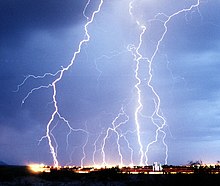What is Electricity?Whats is Nature?
Electricity is bassically a flow of elctric charge.The nature of electricity is to flow through conductor while an electrical potential difference applied across it but not to flow through insulator even high potential difference is applied across them.

Atoms may have loosely bonded electrons in its outer most orbit. These electrons require vary small amount of energy to detach themselves from there parent atoms. These electrons are referred as free electrons which move randomly inside the substance and transferred from one atom to another. Any piece of substances which as a whole contains unequal number of electrons and protons is referred as electrically charged. When there is more number of electrons compared to its protons, the substance is said to be negatively charged and when there is more number of proton compared to electrons, the substance is said to be positively charged. The basic nature of electricity is, whenever a negatively charged body is connected to a positively charged body by means of conductor, the excess electrons of negative body starts flowing towards the positive body to compensate the lack of electrons in that positive body.
Most Basic Law Of electricity:-
The most basic quantities of electricity are voltage, current and resistance.Ohm's law shows a simple relation between these three quantities, hence this law can be considered as most basic law of electrical engineering. This simple, easiest to remember three characters law of electrical engineering helps to calculate and analyze, electrical quantities related to power, efficiency and impedance.
Statement of Ohm's Law
The statement of Ohm’s law is simple and it says that, whenever a potential difference or voltage is applied across a resistor of a closed circuit, current starts flowing through it. This current is directly proportional to the voltage applied if temperature and all other factors remain constant. Thus we can mathematically express it as,

Now putting the constant of proportionality we get,

This particular equation essentially presents, the statement of this law where I is the current through the resistor in unit of Ampere, when the potential difference V is applied across the resistor in unit of volt, and ohm(&Ohm;) is the unit of resistance of the resistor R.

Now putting the constant of proportionality we get,

This particular equation essentially presents, the statement of this law where I is the current through the resistor in unit of Ampere, when the potential difference V is applied across the resistor in unit of volt, and ohm(&Ohm;) is the unit of resistance of the resistor R.

No comments:
Post a Comment